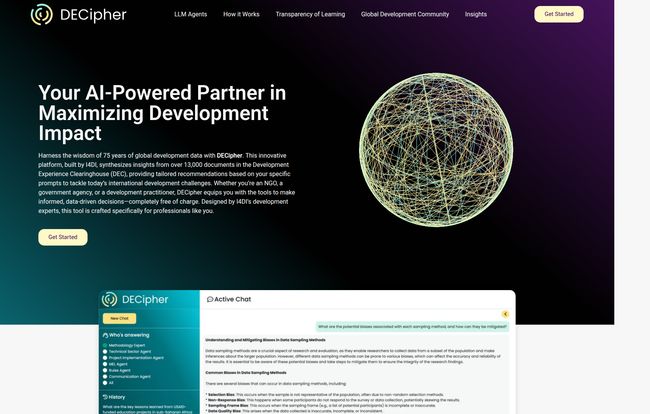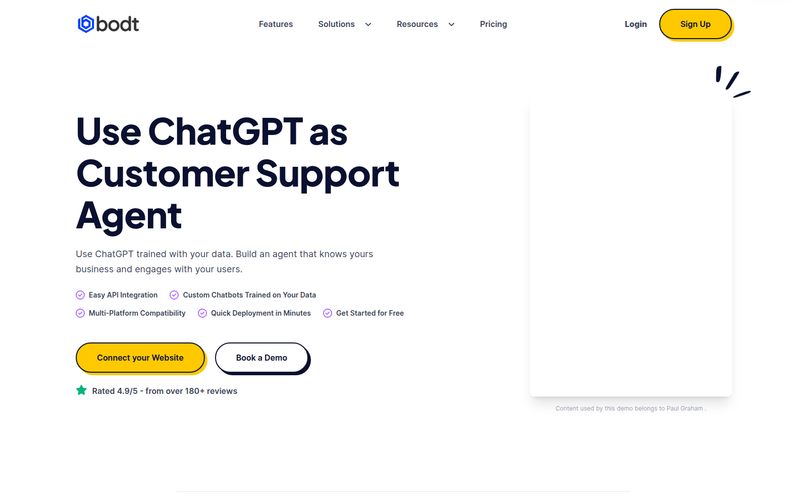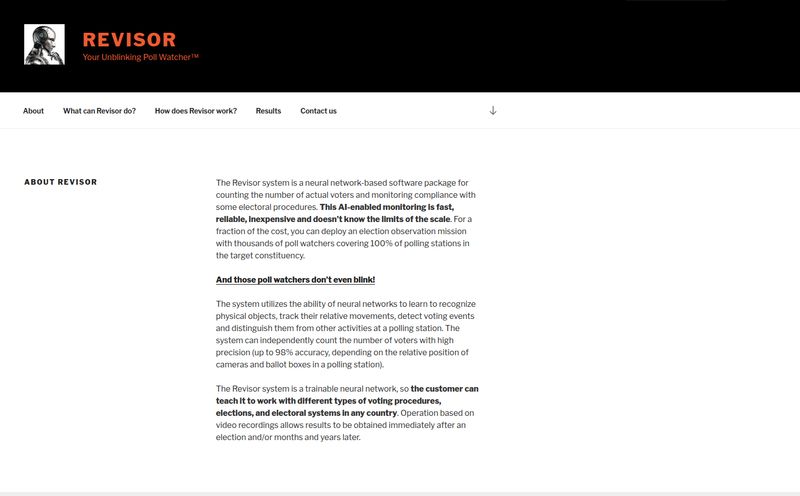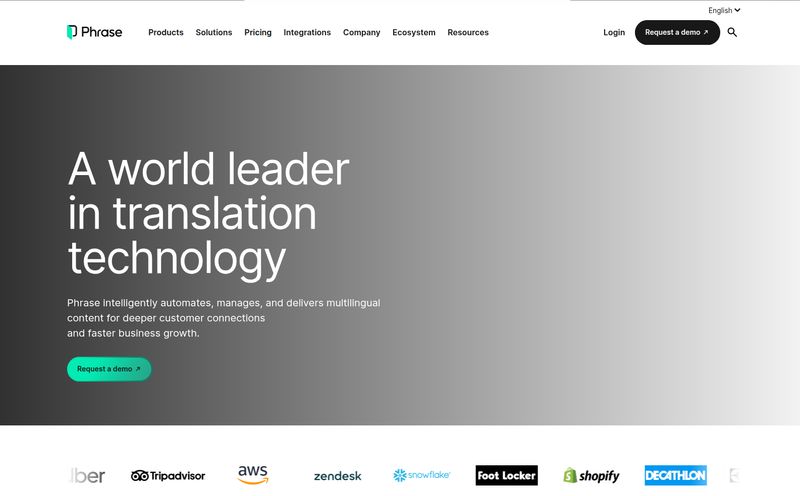If you're in the global development space—whether you're with an NGO, a government agency, or a research institute—you know the pain. The pain of sifting through mountains of reports, white papers, and historical data to find that one golden nugget of information for your next project proposal. It’s like trying to find a specific needle in a continent-sized haystack of needles. We've all been there, fueled by stale coffee at 2 AM, with a dozen PDFs open and a growing sense of dread.
For years, the dream has been to have a super-smart assistant who's read it all and can just... tell you the answer. Well, it seems like someone at the Development Institute (I4DI) was having that same dream. Meet DECipher, an AI-powered tool that claims to do just that. And the best part? It's free. Yeah, you read that right. Free. As an SEO guy who lives and breathes CPC, the word 'free' always makes my ears perk up. So, naturally, I had to take a look.
So, What Exactly is DECipher?
In the simplest terms, DECipher is an intelligent search and analysis tool built specifically for the international development community. It has been fed a diet of over 13,000 documents from the USAID Development Experience Clearinghouse (DEC). We're talking decades of project reports, evaluations, and research spanning pretty much every development challenge imaginable.
Think of it less like a generic chatbot and more like a seasoned research assistant. You don't just ask it a question; you give it a prompt, a problem, a scenario. And instead of just spitting out a link, it synthesizes all that information to give you tailored insights and recommendations. It's designed to bridge the gap between historical data and future action, which is a pretty ambitious goal if you ask me.

Visit DECipher by I4DI
The Magic Under the Hood: CREW AI
Here's where it gets interesting for the tech nerds among us (guilty). DECipher isn't running on a single, general-purpose AI. It's powered by something called CREW AI, which is a system of specialized Large Language Model (LLM) agents. This isn’t just one brain trying to do everything; it's a team of experts.
From what I gathered on their site, they're using a mix of heavy hitters like Llama 3.1 and Mistral's Mixtral-8x7B. Each agent in the 'crew' has a specific job—one might be great at summarizing, another at finding patterns, and a third at structuring the final recommendation. This multi-agent approach is smart. It avoids the generic, one-size-fits-all answers you often get from broader AI tools. It’s the difference between asking a random person for directions and asking a team composed of a local, a cartographer, and a traffic specialist. You're just going to get a better, more nuanced answer from the team.
The Good, The Bad, and The Nuanced
No tool is a silver bullet, and after playing around with DECipher and reading up on it, I've got a pretty balanced view. It’s not perfect, but it’s pretty darn impressive.
What I Really Like About It
First off, the price. It's free. For NGOs and smaller agencies operating on shoestring budgets, this is massive. Access to this level of data synthesis would typically be locked behind an expensive subscription. Making it free is a genuinely commendable move by I4DI. It democratizes access to information that was technically public but practically inaccessible.
Second, the sheer scale of the data is mind-boggling. We're talking about the collective memory of USAID's development work. Being able to query that entire library with a simple prompt is a game-changer for drafting proposals, designing programs, and avoiding mistakes that have been made before. Why reinvent the wheel when you can ask an AI that has seen the blueprints for thousands of them?
A Few Caveats to Keep in Mind
Now, for a dose of reality. The tool's output is only as good as the data it’s trained on. If the original DEC documents are incomplete, biased, or contain outdated information, those flaws can be reflected in the AI's recommendations. This is a classic "garbage in, garbage out" scenario, but it's something every data professional has to contend with.
There's also the ever-present conversation around AI bias. The tool is designed to be objective, but the source material itself carries the perspectives and priorities of its time. Always cross-reference the insights with other sources and your own on-the-ground knowledge. Consider DECipher a powerful advisor, not an infallible oracle. Its effectiveness also really hinges on how specific your prompts are. A vague query like "help with poverty" will yield vague results. A detailed prompt about "best practices for microfinance initiatives for female entrepreneurs in rural East Africa" will give you something much more actionable.
Who Is This Tool Actually For?
This is not a tool for the casual user. It's been purpose-built for a specific tribe of people:
- NGO Program Managers: Quickly find evidence to support a new project design or grant application.
- Development Consultants: Get up to speed on a new sector or region without spending weeks on background research.
- Agency Staff: Analyze past project performance to inform future strategies and avoid past pitfalls.
- Researchers and Academics: Identify trends and gaps in development practice across a huge dataset.
If you're in one of these roles, this tool could genuinely streamline your workflow and improve the quality of your output. It’s about working smarter, not just harder.
Getting Started With DECipher
Using the tool seems straightforward enough. You land on the page, and you're presented with a prompt to start a conversation with the AI. The user interface is clean, focusing your attention on the task at hand. While navigating their site, I did hit a quirky little 'Page not found' error at one point, which was a good reminder that even the most advanced systems have their human—or perhaps digital—hiccups. A quick click back got me where I needed to be.
The real skill will be in mastering the art of the prompt. My advice? Be specific. Provide context. Tell the AI who you are and what you're trying to achieve. The more you give it, the more it can give you back.
Frequently Asked Questions
- Is DECipher really free to use?
- Yes, according to I4DI, the tool is offered for free to support NGOs, agencies, and development practitioners. This is one of its most significant advantages.
- What kind of data does DECipher analyze?
- It analyzes a massive library of over 13,000 documents from the USAID Development Experience Clearinghouse (DEC). This includes decades of program evaluations, reports, and strategic documents.
- Do I need to be an AI expert to use it?
- Not at all. While the underlying tech is complex, the user interface is designed to be conversational. However, some familiarity with development terminology will help you write more effective prompts and better understand the results.
- What makes CREW AI different from something like ChatGPT?
- The main difference is specialization. Instead of one general-purpose AI, CREW AI uses a team of specialized agents that collaborate to handle your request. This allows for a more focused and nuanced analysis tailored to development-specific challenges.
- How accurate is the information?
- The tool synthesizes information from official DEC documents, so its accuracy is tied to the quality of that source material. It's a powerful research assistant, but it's always wise to critically evaluate its outputs and cross-reference key findings.
My Final Verdict
So, is DECipher the future of development research? It just might be a huge leap in the right direction. It's a powerful, thoughtfully designed tool that addresses a very real pain point in the industry. The fact that it's free removes a massive barrier to entry, putting sophisticated data analysis into the hands of those who need it most.
Of course, it comes with the standard AI caveats—be mindful of source data limitations and potential biases, and remember that it's a co-pilot, not an autopilot. But for any development professional looking to ground their work in decades of evidence, DECipher is, without a doubt, a tool you need to check out. It's an exciting development, and I'll be keeping a close eye on how it evolves.
Reference and Sources
- DECipher Official Website
- Development Institute (I4DI)
- USAID Development Experience Clearinghouse (DEC)



